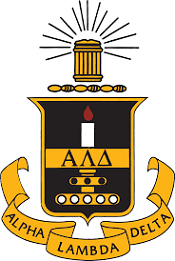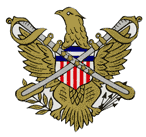
The Golden Key International Honour Society is an Atlanta, Georgia-based non-profit organization founded in 1977 to recognize academic achievement among college and university students. Membership into Golden Key is offered to undergraduate and graduate students recognized to be among the top 15% of their class by GPA.

The Tau Beta Pi Association is the oldest engineering honor society and the second oldest collegiate honor society in the United States. It honors engineering students in American universities who have shown a history of academic achievement as well as a commitment to personal and professional integrity. Specifically, the association was founded "to mark in a fitting manner those who have conferred honor upon their Alma Mater by distinguished scholarship and exemplary character as students in engineering, or by their attainments as alumni in the field of engineering, and to foster a spirit of liberal culture in engineering colleges".

Alpha Lambda Delta (ΑΛΔ) is an honor society for students who have achieved a 3.5 GPA or higher during their first year or term of higher education.

Phi Sigma Pi National Honor Fraternity (ΦΣΠ) is a gender-inclusive/mixed-sex national honor fraternity based in the United States. The fraternity is a 501(c)(3) not-for-profit organization incorporated in the state of Pennsylvania to foster scholarship, leadership, and fellowship. Phi Sigma Pi chapters are at more than 140 four-year collegiate institutions.

In the United States, an honor society is an organization that recognizes individuals who excel in various domains such as academics, leadership, and other personal achievements, not all of which are based on ranking systems. These societies acknowledge excellence among peers in diverse fields and circumstances. The Order of the Arrow, for example, is the National Honor Society of the Boy Scouts of America. While the term commonly refers to scholastic honor societies, which primarily acknowledge students who excel academically or as leaders among their peers, it also applies to other types of societies.

Delta Phi Alpha National German Honor Society (ΔΦΑ) is an American collegiate honorary society for German studies. Delta Phi Alpha was founded on May 27, 1929, at Wofford College in Spartanburg, South Carolina. The society has chartered over three hundred chapters at colleges and universities in the United States.

Sigma Tau Delta (ΣΤΔ) is a US-based, international honor society for students of English at four-year colleges and universities who are within the top 30% of their class and have a 3.5 GPA or higher. It presently has over 770 chapters in the United States and abroad. The organization inducts over 7500 new members annually, and is the largest honors organization in its field and one of the largest members of the Association of College Honor Societies (ACHS).

Alpha Chi National College Honor Society is an American collegiate honor society recognizing achievements in general scholarship. It was formed in 1922 by nineteen schools in the state of Texas; however, the first official meeting to discuss the founding of an intercollegiate honor society, held on February 22, 1922, only saw five schools represented. Since then it has expanded to 300 chapters throughout the United States. It is an open society that invites university juniors, seniors, and graduate students who are in the top 10 percent of their class into its ranks.
The National Junior Honor Society (NJHS) is an American international student organization that consists of chapters in middle schools. The NJHS was founded by the National Association of Secondary School Principals, and today has chapters in the United States, other U.S. territories, and around the world. To be considered for membership, applicants must reach the five standards which include leadership, citizenship, character, service, and scholarship. The National Junior Honor Society recognizes students who exemplify leadership and citizenship, as well as provide educational opportunities. For the scholarship standard, the student scholar must have a minimum grade point average (GPA) of 3.0 from a scale of 4.0. This, however, can vary between schools.

Alpha Epsilon Delta (ΑΕΔ) is a U.S. health preprofessional honor society. The organization currently has more than 144,000 members within 186 chapters at universities throughout the United States, making it the world's largest honor society serving all students from different backgrounds in the pursuit of a healthcare career.

Sigma Delta Pi (ΣΔΠ) is the National Collegiate Hispanic Honor Society. It was established on November 14, 1919, at the University of California at Berkeley.

Pi Delta Phi (ΠΔΦ) is the National French Honor Society—La Société d'Honneur de Français—for undergraduate and graduate students at accredited public and private colleges and universities in the United States.

Theta Alpha Kappa (ΘΑΚ) is an American national honor society for religious studies and theology.

Scabbard and Blade (S&B) was a college military honor society founded at the University of Wisconsin in 1904. Although membership was open to Reserve Officers' Training Corps (ROTC) cadets and midshipmen of all military services, the society was modeled after the U.S. Army, calling its chapters companies

Sigma Lambda Alpha (ΣΛΑ) is a North American scholastic honor society that recognizes academic achievement among students in the field of landscape architecture. It was established in 1977 at the University of Minnesota by the Council of Educators in Landscape Architecture.

Kappa Omicron Nu (ΚΟΝ) is a college honor society, based in the United States, for students in human sciences. Kappa Omicron Nu chapters are located at colleges and universities that offer a strong human sciences program. Its mission is to promote empowered leaders through excellence in scholarship, leadership, and research in the human sciences. There is also a strong focus on service and contribution to the local community.
Rho Chi (ΡΧ) is an international honor society for pharmaceutical sciences. It was founded on May 19, 1922, to "encourage high scholastic achievement and fellowship among students in pharmacy and to promote the pharmaceutical sciences".

Pi Omega Pi (ΠΩΠ) is an American scholastic honor society recognizing academic achievement among students in the field of business education.

Phi Upsilon Omicron (ΦΥΟ), sometimes called Phi U, is a scholastic honor society that recognizes academic achievement among students in the field of family and consumer science.

Chi Alpha Sigma (ΧΑΣ), also known as the National College Athlete Honor Society, is an honor society for collegiate student-athletes. Established in 1996, it was the first national society to honor scholar-athletes who excel in both the classroom and athletics.


















